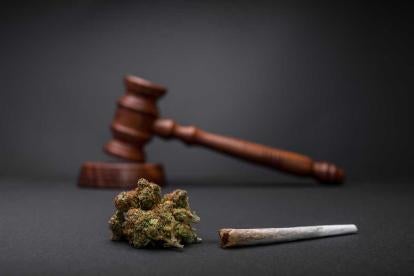How close is too close? The answer to this question can have dire implications for people and companies involved in the cannabis industry who wish to seek bankruptcy protection. Last month, a United States District Court issued an opinion which, while it did not directly answer this question, rejected a “zero tolerance” cannabis policy and recognized the principle that the “mere presence” of cannabis near a bankruptcy case does not, in and of itself, preclude bankruptcy relief.
Background of the Case
The facts of In re Kojima are relatively straightforward. The debtors were two individuals, Don and Susan Kojima (the “Debtors”), who were real estate investors and developers and had purchased property in Adelanto, California for the growing of cannabis. The Debtors subsequently entered into a profit-sharing agreement with three individuals (“KGP”) under which KGP would be allowed to use a cannabis license held by companies owned by the Debtors (the “Adelanto Entities”). Three years later, the profit-sharing arrangement was terminated by the Debtors and Adelanto Entities who alleged that KGP owed them $360,000. In response, KGP filed suit in state court against the Debtors asserting a variety of claims and seeking $15 million in damages. The Debtors asserted a counterclaim for the $360,000 allegedly owed by KGP.
While the state court action was proceeding, the Debtors filed voluntary petitions for Chapter 11 bankruptcy. The case was subsequently converted to Chapter 7, and a Chapter 7 Trustee (the “Trustee”) was appointed. The Trustee reached a settlement with KGP and sought approval of the settlement from the bankruptcy court under Bankruptcy Rule 9019. Among other terms, the proposed settlement provided that (a) KGP would receive a $6.98 million subordinated claim, (b) KGP would dismiss the state court action against the Debtors and stay the action against the Adelanto Entities, and (c) the one parcel then used for cannabis operations would go to the benefit of KGP, and not the estate.
The Debtors and Adelanto Entities (collectively the “Appellants”) objected to the proposed settlement arguing in pertinent part that the settlement would violate the Controlled Substances Act (the “CSA”) by requiring the Trustee to settle a state court action tainted by CSA violations given the use of the property for the growing of cannabis. The bankruptcy court recognized the Appellants’ concerns, but relied on the Trustee’s representations that no cannabis-related assets would “come into play.” The bankruptcy court specifically cautioned that “if despite Trustee’s best understanding of the assets involved, cannabis-related assets are discovered, the court would expect Trustee to alert the court immediately and take all necessary actions to prevent administration of such assets.” The settlement was then approved.
On appeal to the district court, the Appellants argued that the Trustee could not settle KGP’s claims against the Debtors because the claims concerned a dispute arising from a cannabis business which was operating in violation of the CSA. In support, the Appellants relied on In re Burton, 610 B.R. 633 (B.A.P. 9th Cir. 2020) and In re Malul, 614 B.R. 699 (Bankr. D. Colo. 2020), in which cases the courts had held that a debtor’s assertion of a cannabis-related state claim violated the CSA and therefore precluded bankruptcy relief.
The district court began its analysis by recognizing the conflict between the CSA and the laws of those states that have legalized the use of cannabis, as well as the “difficult issues” raised when a debtor has ties to cannabis. These “difficult issues” were colorfully described by the Malul court as follows:
If the uncertainty of outcomes in marijuana-related bankruptcy cases were an opera, Congress, not the judiciary, would be the fat lady. Whether, and under what circumstances, a federal bankruptcy case may proceed despite connections to the locally “legal” marijuana industry remains on the cutting-edge of federal bankruptcy law. Despite the extensive development of case law, significant gray areas remain. Unfortunately, the courts find themselves in a game of whack-a- mole.
Malul, 614 B.R. at 701. Nonetheless, the district court noted that one principle seems to have emerged from the cases trying to thread a cannabis strain through the bankruptcy needle, namely that “the mere presence of marijuana near a bankruptcy case does not automatically prohibit a debtor from bankruptcy relief.”
In addition, the district court distinguished the present case with Burton and Malul in that here the cannabis-related claims belonged to KGP and not the Debtors. The court reasoned that while Burton and Malul “suggest that a bankruptcy court’s involvement in a debtor’s cannabis-related claims is improper because it would lead to the receipt and administration of assets tainted by CSA violations,” there was no authority presented holding that settling a third party’s cannabis-related claims is also improper.
The district court concluded its analysis of Appellants’ arguments under the CSA by emphasizing that “[r]easonable minds may differ on how close a debtor’s actions must come to a CSA violation to preclude bankruptcy relief.” As a result, there is no per se rule on when a cannabis-related case must be dismissed. In support, the district court quoted from Burton:
We believe the stated reluctance in this Circuit to adopt per se bright-line rules requiring the immediate disposition of bankruptcy cases in which marijuana activity is present, and the flexible cause standard under § 1307(c), coupled with the abuse of discretion standard of review on appeal, give bankruptcy courts appropriate latitude to deal with these variations.
Burton, 610 B.R. at 639. After concluding that the settlement was fair and equitable, the district court affirmed the bankruptcy court’s approval of the settlement.
Takeaways
The district court’s opinion in Kojima is one of the few appellate-level decisions that approved the exercise of bankruptcy jurisdiction over a cannabis-related business. However, the case’s importance should not be overstated. Instead, it is clear from the opinion that the district court’s decision would have been different had the settlement resolved cannabis-related claims held by a debtor against a third party. Nonetheless, the district court was clear in its rejection of a “zero tolerance” policy towards cannabis. Instead, under the rationale of Kojima, the bankruptcy courts will need to make the determination of whether a debtor’s involvement in cannabis is too much to permit bankruptcy relief, and the bankruptcy courts will have wide latitude to make these determinations. Simply put, the outer boundaries of what is and is not permitted will continue to be litigated, at least until Congress removes cannabis from the list of controlled substances.




 i
i


